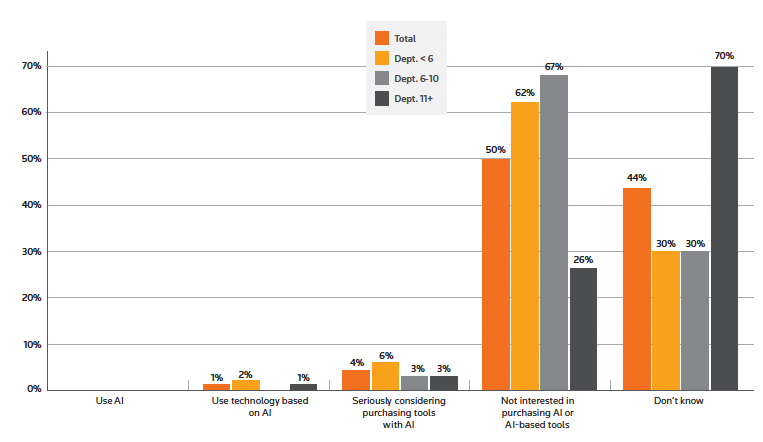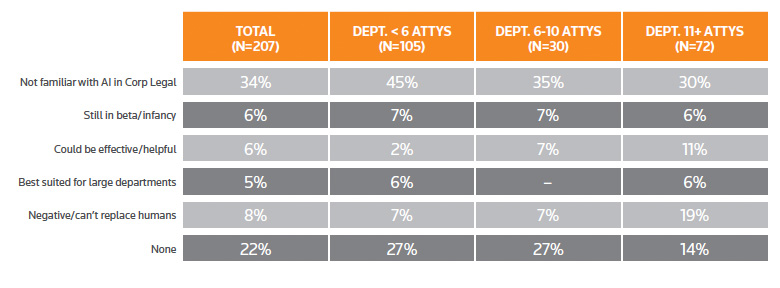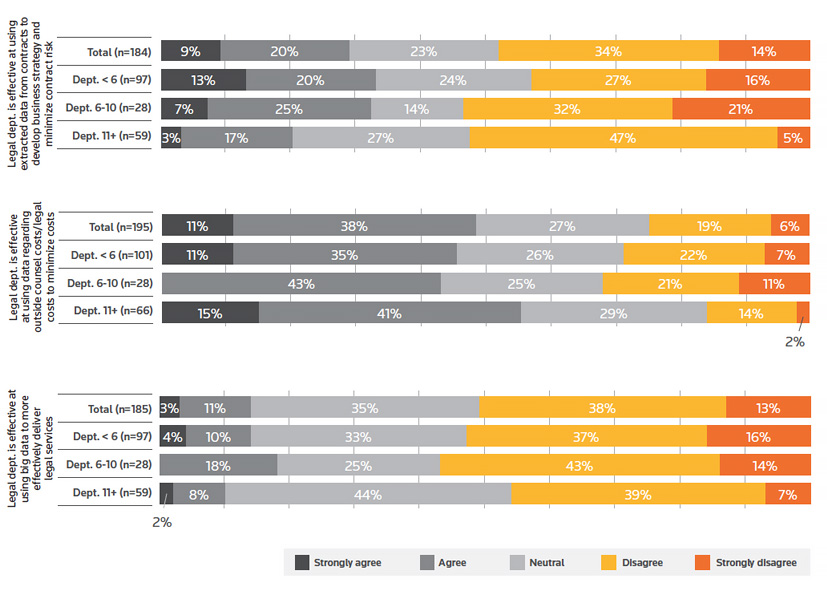Corporate counsel generally consider themselves to be open to using new technologies in their legal departments, except when it comes to artificial intelligence technology. When it comes to AI, corporate counsel are largely uninterested or uninformed.
These are among the findings of a just-published survey conducted by Thomson Reuters, Ready or Not: Artificial Intelligence and Corporate Legal Departments. The survey polled 207 in-house counsel about their current perceptions regarding the use of AI in corporate legal departments and the perceived benefits of AI once adopted.
Two-thirds of corporate counsel consider themselves confident about trying new technology, the survey found. but when asked about their current or planned use of AI, half said they are not interested in purchasing AI tools and another 44 percent said they simply do not know. No one said they currently use AI and just 1 percent said they currently use technology based on AI.
Thomson Reuters’ report of the survey concluded that larger legal departments are more open to using AI. To back this up, it noted that in departments with 11 or more attorneys, only 26 percent believed their departments were not interested in AI. But that conclusion seems to be a stretch, given that the same graphic shows that, in departments of 11 or more attorneys, 70 percent answered that they did not know about their department’s current or planned use of AI, just 1 percent said they currently use AI and just 3 percent said they are seriously considering purchasing AI tools.
The survey also asked in-house counsel about their current perceptions of AI use in legal departments. The chart above shows the results. As you can see, 34 percent are unfamiliar with AI in corporate legal. In departments of fewer than six attorneys, 45 percent are unaware. Only 6 percent of in-house counsel say AI could be effective or helpful.
“Many respondents were too unfamiliar with AI software to have an opinion,” the report says. “Numerous respondents characterized their current perceptions along these lines: ‘I don’t really have any. I have not thought about this subject at all.’”
The survey report correctly observes that one of the best uses of AI in legal departments may be in helping them better understand their own data and make data-driven decisions. Yet while in-house counsel acknowledge that they have access to data, they are not making effective use of it:
For example, almost two-thirds of survey respondents indicated their legal departments have access to data regarding outside counsel costs and legal costs, yet less than half (49%) feel they are effectively using this data. Similarly, only 29% of respondents indicated their legal departments are effectively using data extracted from contracts to develop business strategy or minimize contract risks.
(Compare this to Altman Weil’s 2016 Chief Legal Officer Survey, which found that one of the most effective ways for legal departments to enhance efficiency is to better collect and analyze management data. But that survey found a problem in access to data: 73 percent of chief legal officers said their top 10 outside law firms provided them no useful spend analysis.)
The Thomson Reuters survey found that less than 15 percent of corporate counsel believed their legal departments are effectively using big data to deliver legal services. Yet it notes that this intersection of big data and AI-driven analysis is precisely where AI could be highly effective in helping departments reduce costs, develop business strategy, minimize contract risks, and enhance legal services.
While some in-house counsel saw benefits in using AI — particularly reducing time and saving costs — they were only a minority of the survey’s respondents. When asked when AI will become mainstream in legal departments, just 21 percent saw that happening within five years and 39 percent said it would take 10 years. Another 37 percent said it would be more than a decade before AI becomes mainstream.
So, other than lack of knowledge or understanding about AI, what is holding corporate counsel back from adoption? The top-cited concern was cost. One respondent explained: “I assume the cost will be significant, so the benefits need to be clear, tangible and capable of replication across entities and platforms.”
Other hurdles to adoption include reliability, particularly with respect to confidentiality and ethical considerations; accuracy; training and learning curves; and resistance to change.
The survey report concludes by urging in-house attorneys not to let AI’s potential hurdles keep them from realizing its potential. “Corporate counsel will eventually need to accept and adopt AI tools because, ready or not, they’re already here.”
Read the report online or download the PDF version from Thomson Reuters.
 Robert Ambrogi Blog
Robert Ambrogi Blog

